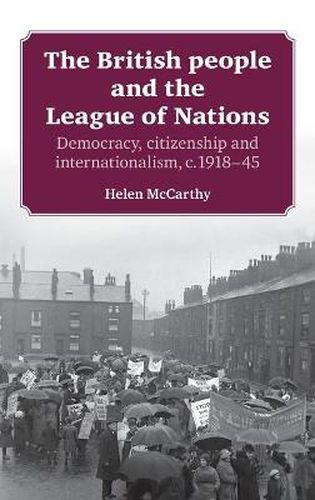Readings Newsletter
Become a Readings Member to make your shopping experience even easier.
Sign in or sign up for free!
You’re not far away from qualifying for FREE standard shipping within Australia
You’ve qualified for FREE standard shipping within Australia
The cart is loading…






In the decades following Europe’s first total war, millions of British men and women looked to the League of Nations as the symbol and guardian of a new world order based on international co-operation. Founded in 1919 to preserve peace between its member-states, the League inspired a rich, participatory culture of political protest, popular education and civic ritual which found expression in the establishment of voluntary societies in dozens of countries across Europe and beyond. Through the hugely popular League of Nations Union (LNU), this pro-League movement touched Britain in profound ways. Foremost amongst the League societies, the LNU became a pioneering advocate of democratic accountability and popular engagement in the making of foreign policy. Using previously undiscovered sources, The British People and the League of Nations is a groundbreaking work which offers a vivid and readable account of this popular League consciousness, revealing the extraordinarily vibrant character of associational life between the wars. It is the first account to explore the complex constituencies making up the popular League movement, and to show how internationalism intersected with class, gender, religion and party politics during a period of profound social, cultural and political change. This book is essential reading for scholars and students of modern British history, as well as anyone interested in the dynamics of social and political movements.
$9.00 standard shipping within Australia
FREE standard shipping within Australia for orders over $100.00
Express & International shipping calculated at checkout
In the decades following Europe’s first total war, millions of British men and women looked to the League of Nations as the symbol and guardian of a new world order based on international co-operation. Founded in 1919 to preserve peace between its member-states, the League inspired a rich, participatory culture of political protest, popular education and civic ritual which found expression in the establishment of voluntary societies in dozens of countries across Europe and beyond. Through the hugely popular League of Nations Union (LNU), this pro-League movement touched Britain in profound ways. Foremost amongst the League societies, the LNU became a pioneering advocate of democratic accountability and popular engagement in the making of foreign policy. Using previously undiscovered sources, The British People and the League of Nations is a groundbreaking work which offers a vivid and readable account of this popular League consciousness, revealing the extraordinarily vibrant character of associational life between the wars. It is the first account to explore the complex constituencies making up the popular League movement, and to show how internationalism intersected with class, gender, religion and party politics during a period of profound social, cultural and political change. This book is essential reading for scholars and students of modern British history, as well as anyone interested in the dynamics of social and political movements.